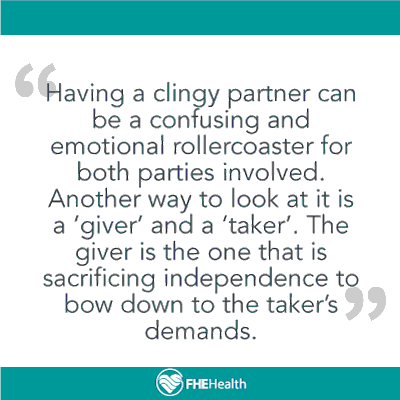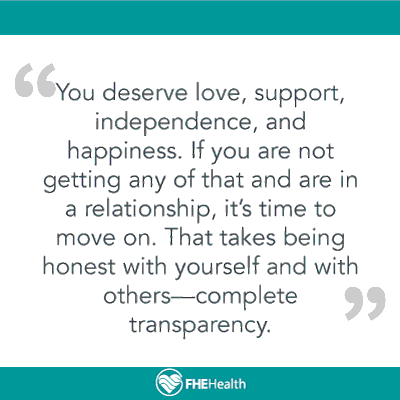
The goal of a romantic relationship is for there to be a sense of balance in the entire ordeal. Having a significant other in life more or less means you have decided to team up in this life and take it on together. Simple right?
Yeah, not quite.
As I have discussed before, intimate relationships are perhaps one of the most challenging, most complicated things to tackle in life. When it comes to those of us in recovery? We can make it a special type of complicated if left to our own devices.
No, this isn’t another article telling you how to be a better partner or admit that you are wrong more. Today, I want to speak to those on the right path who have done some work but may have a partner holding them down or not keeping their end of the bargain.
Suppose you are someone who has chosen the 12-step path, gone through the steps vigorously, and had a spiritual experience, congratulations. It’s a fantastic journey to truly change and feel like an entirely different person in the process.
One caveat of that path is that it becomes easier to notice those who may still be stuck in pre-change mode and are not doing much to address it. If that person happens to be your significant other, it can be way harder to admit that they are not holding their end of the bargain.
Having A Codependent Partner
 There is a broad spectrum for codependent relationships; somewhere on that spectrum is one person being codependent on a person who wants so bad for both of you to be independent. The term ‘clingy’ describes the trait very well.
There is a broad spectrum for codependent relationships; somewhere on that spectrum is one person being codependent on a person who wants so bad for both of you to be independent. The term ‘clingy’ describes the trait very well.
Having a clingy partner can be a confusing and emotional rollercoaster for both parties involved. Another way to look at it is a ‘giver’ and a ‘taker. The giver is the one that is sacrificing independence to bow down to the taker’s demands.
The giver longs for the relationship to grow and evolve and feels that that day will come if they fill the taker’s needs/requests. It usually doesn’t.
While this goes on, this is usually dressed up with love and compassion being shown on both sides, and it keeps the truth from being brought out into the light. The cycle of this dynamic inevitably gets ugly and can blow up at any time.
This article is for all givers out there (written by a former giver). Take this moment to be honest with yourself and read on; this can be a hard pill to swallow for many.
Signs of a Clingy Taker
When in a relationship, of course, you are supposed to help each other. What is the balance on that help, though? With a codependent relationship, it is very lopsided. Let’s list out some signs that you may be dating a taker.
Inability to compromise: It doesn’t take a relationship therapist with a master’s degree to tell you that compromise is vital and needed for any long-term relationship. Is there a compromise in yours? Or is it their way or the highway? After a while, you can get conditioned to agree with them, or what they want because, you know, that will keep things peaceful and quiet.
Avoiding conflict: To confront them would nearly guarantee a blow-up on their end, which is the last thing you want, and your partner probably knows getting upset will let them get their way.
Upset making plans without them: This is a big one; if you want to go out with your friends/social circle, what is your partner’s reaction? The codependent partner may be passive-aggressive or manipulative to guilt you from going. If you go, they hope they made you feel guilty that you aren’t spending time with them.
React terribly to the word ‘no’: If you are a giver, you are a people pleaser. That means you want to do everything for everybody in fear of what saying no would do. In a relationship, this can be the catalyst of codependency. If you said no to even the most trivial of requests to your partner, how would they react?
The critical thing to note is that this dynamic becomes second nature to all parties involved, making it hard for either side to admit something is wrong.
Taking Action and Advocating
 Okay, so let’s say these things resonate with you, and you have swallowed that big ole pill of truth. What can be done? First of all, find someone you trust and talk to them about it. A pervasive part of these relationships is that it’s dressed up like a good one, and the giver does not dare let someone know entirely what is going on.
Okay, so let’s say these things resonate with you, and you have swallowed that big ole pill of truth. What can be done? First of all, find someone you trust and talk to them about it. A pervasive part of these relationships is that it’s dressed up like a good one, and the giver does not dare let someone know entirely what is going on.
Having someone confirm that you are not being treated right can take some weight off the shoulders but remember, it takes two to tango. You have a part in this unhealthy relationship too.
If you feel you are with a clingy, codependent partner, you should plan to have a challenging conversation. Be completely honest without being antagonizing, and do not give in to their reaction if it is anything but understanding.
In my opinion, there is a good chance you need to leave them, at least temporarily. It is possible they will not respond as poorly to that tough conversation as you think but will not follow up with any action afterward.
Listen, you are the most important person in your life. You deserve love, support, independence, and happiness. If you are not getting any of that and are in a relationship, it’s time to move on. That takes being honest with yourself and with others—complete transparency.
Do not wait because you think “things can change.” Life is short.






